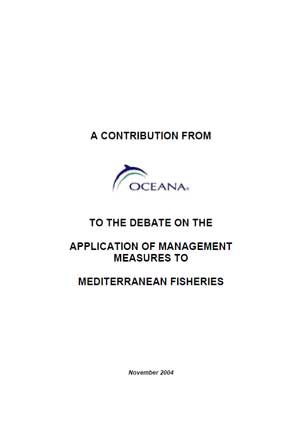Report | May, 2010
A contribution from Oceana to the debate on the application of management measures to mediterranean ficheries
At Oceana we take a very positive view of the efforts being made by the Fisheries Directorate-General and the European Commission to establish criteria of sustainability in Mediterranean fisheries in accordance with the recently-passed new EU Common Fisheries Policy.
At the same time, we believe that many of the Commission’s proposals, which on occasion do not have a scientific basis but are more closely geared towards trying to achieve a minimum common denominator that is capable of establishing acceptable criteria for all the stakeholders involved, even when not regarded as “biologically acceptable”, do conform to an intelligent strategy in trying to channel the problems and lay the foundations to building the path towards improving Mediterranean fisheries.
Many of the “sacrifices” being proposed by the Commission are difficult to accept from a technical, scientific and conservationist point of view, as on occasion they entail “legalising” the constant violations to current legislation in order to integrate them within a plan that allows resource management to be brought into line in the future.
Thus despite the fact that certain measures may entail a significant setback, a step backwards, or even putting the biological viability of certain species at risk, at Oceana we are prepared to accept the valiant mission being proposed by the Commission to try to find viable solutions to an environmental, economic and social problem of this scale, if, indeed, these measures are truly geared towards achieving an effective and plausible agenda that will guide us on the right road. In other words, we are willing to consider short-term sacrifices if these are going to bring about evident benefits in the medium and long term.
In the text that appears below, our intention is to express Oceana’s initial standpoint, which is totally open to discussion and to finding solutions, in which not only do we articulate our agreements and discrepancies with the Commission’s proposals, but also put forward alternative solutions that we hope will be taken into consideration.
We believe there is a need for the essence of this plan, or compilation of measures for the management of Mediterranean fisheries, to clearly indicate that the objective is to achieve sustainable management of resources and recover the dynamic and biocenosis of the different ecosystems and marine habitats, including their species, populations, etc.
It would also be important for all exceptions to be clearly indicated, always within a management plan and as part of the catch quotas. As indicated in article 17, no plan for managing, protecting or creating closed zones should be set in stone, but should rather be at the service of scientific advances, a principle which is entirely applicable to the other articles and proposals.
It would be of equal interest to mention that this strategy is aimed at species both with and without commercial value so that within the established deadlines they can achieve replenishment of at least 75% of their biomass, including populations, age blocks, etc. This request may not be an “initial or main objective” at this stage of negotiations, but it should be included as a target objective when reviewing compliance with the present directive within five years.
Detailed below are our comments on both the proposal for a Council Regulation COM(2003)589 and the text resulting from the meeting with the different stakeholders involved on 1 October 2004.




